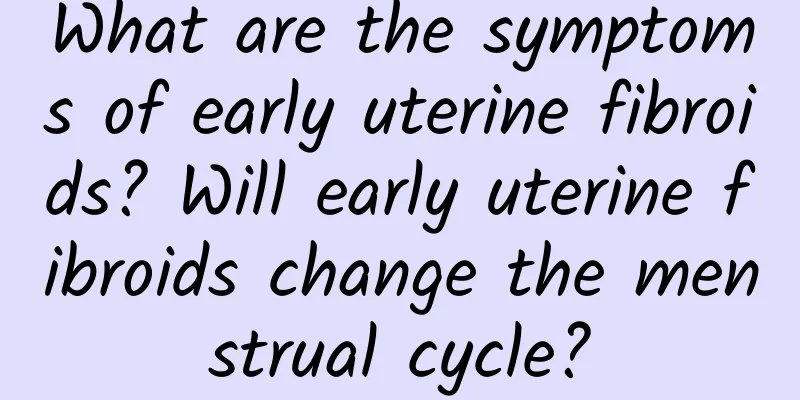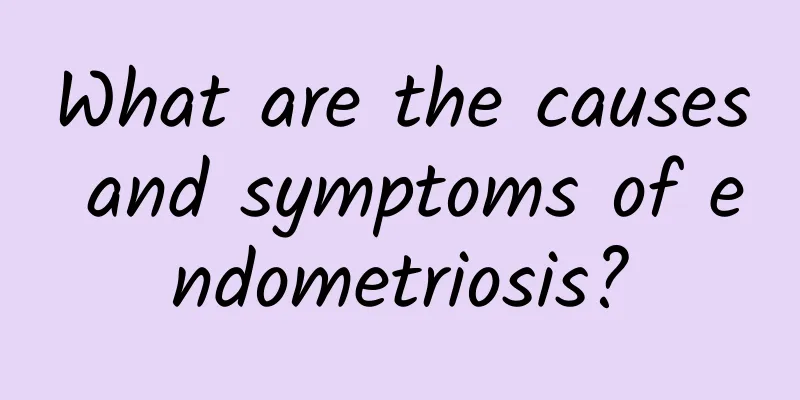What are the symptoms of early uterine fibroids? Will early uterine fibroids change the menstrual cycle?

|
Although uterine fibroids are just benign tumors caused by the proliferation of uterine smooth muscle tissue, complications or malignant changes may occur. Generally speaking, about 0.5%-1% of uterine fibroids become malignant sarcomas. These patients are usually older. Doctors remind that with the increase in unmarried sexual behavior, the incidence of women around 30 years old increases, so regular gynecological examinations should start at the age of 30, not just after marriage. If women experience abnormal phenomena such as irregular menstruation, increased menstrual volume, prolonged menstruation, irregular vaginal bleeding, lower abdominal pain, increased leucorrhea, or feel a lump in the lower abdomen, they should go to the hospital for further examination immediately to prevent the rapid growth and degeneration of uterine fibroids. Uterine fibroids are common benign tumors in the female reproductive system, mostly seen in women aged 30-50. Their occurrence is related to excessive estrogen and long-term stimulation (such as recurrent miscarriage), and most of them can be detected early. If a woman has the following five conditions, she should be alert and go to the hospital for further examination and diagnosis. (1) Menstrual changes. If your normal menstrual cycle changes, such as increased menstrual blood volume, prolonged menstruation, or irregular menstruation, this is something to consider. (2) Pain. Most patients with uterine fibroids do not feel pain, but a few may experience lower abdominal pain after fibroid infection or uterine deformation. (3) Lumps. The lump may be felt in the lower abdomen, especially when the bladder is full of urine. (4) Pressure. Most patients with uterine fibroids do not feel anything. However, if the fibroid is located low, even if the tumor is not large, it can compress adjacent organs such as the bladder, causing difficulty in urination; if it compresses the rectum, defecation becomes difficult; and if it compresses the ureter, symptoms such as back pain may occur. (5) Infertility: A small number of patients with uterine fibroids may suffer from infertility because the uterus is deformed, which is not conducive to the implantation of the fertilized egg. If you find 1 or 2 of the above phenomena, you should go to the hospital as soon as possible for further diagnosis and treatment. |
>>: Specific symptoms of uterine fibroids What is the best thing to eat if you have uterine fibroids
Recommend
How to treat chronic cervicitis with traditional Chinese medicine
How does TCM treat chronic cervicitis? Cervicitis...
Can abortion cause ovarian cysts? What are the prevention methods?
Can abortion cause ovarian cysts? Are there any p...
How much is the appropriate amount of surgery for intrauterine adhesions?
Most adhesion patients are most concerned about t...
Is uterine cyst serious? Generally no treatment is needed
Many people are worried when they find out about ...
No pain from exercise! Experts teach 3 exercises to prevent discomfort
As the trend of health care becomes more popular ...
Does running improve health? A man runs three times a week and is found to have lung nodules during a health check-up!
Is running definitely good for your health? Mr. Y...
Give him what he likes! 3 snacks to help children develop a balanced diet
What should I do if my child has a picky eating h...
Some detailed diagnostic methods for adnexitis
Adnexitis is the most common gynecological diseas...
How should women recover after abortion? What should women eat after abortion?
Abortion is a way to terminate pregnancy. There a...
What are the symptoms of tuberculous cervicitis? Analysis of the causes and symptoms of tuberculous cervicitis
Cervicitis is a common gynecological inflammation...
How to judge premature ovarian failure
How to determine premature ovarian failure? In re...
Which Chinese medicine can treat pelvic inflammatory disease
Which Chinese medicines can treat pelvic inflamma...
What are some good ways to solve dysmenorrhea?
What are the good ways to solve dysmenorrhea? Dys...
5 tips for office workers to prevent obesity from overwork! Private Edition Preview
When modern people talk about the word "over...
What are the causes of uterine fibroids? What are the surgical care methods for uterine fibroids?
Uterine fibroids are one of the most common benig...









